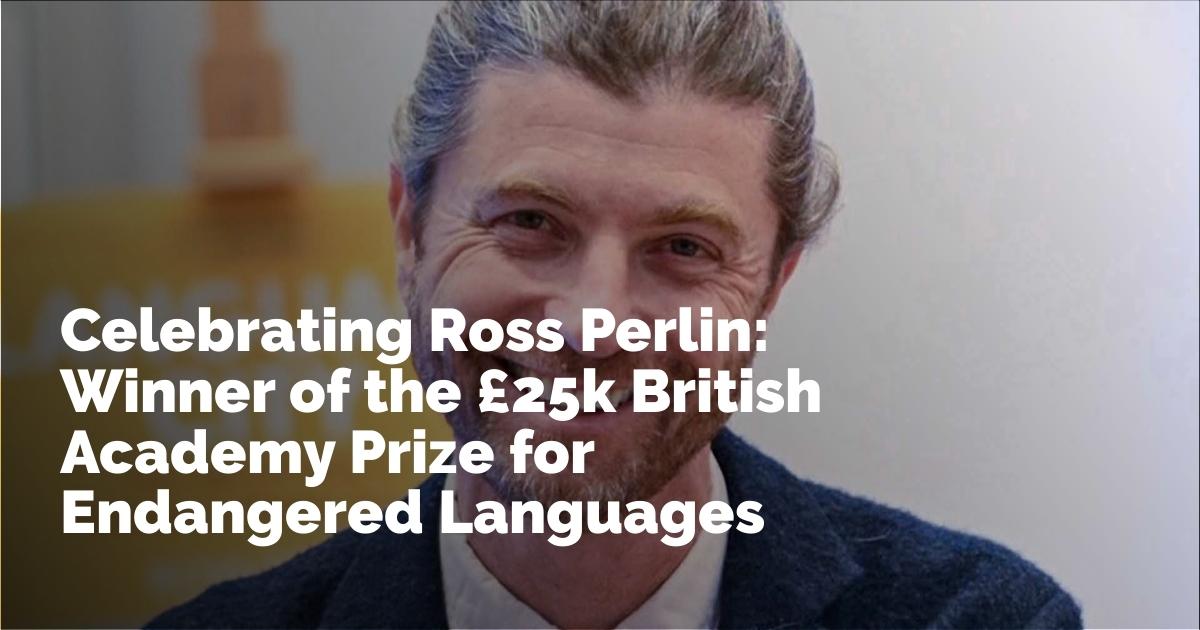Ross Perlin's Triumph in Highlighting Linguistic Diversity
Ross Perlin's accolade-winning work, "Language City: The Fight to Preserve Endangered Mother Tongues," has captured the attention and admiration of literary enthusiasts and cultural scholars alike, earning him the prestigious £25,000 British Academy Book Prize for Global Cultural Understanding. This significant recognition underscores the importance and urgency of Perlin's mission to shine a light on endangered languages, particularly within the vibrant, polyglot microcosm of New York City.
The Announcement and Celebration of Ross Perlin's Achievement
The award was announced by professor Charles Tripp FBA, the chair of the judging panel, at an event held at the British Academy on the evening of October 22nd. This honor places Perlin, an American author and respected linguist, among the ranks of notable global writers. He serves as the co-director of the Endangered Language Alliance, a Manhattan-based non-profit organization dedicated to the documentation and support of endangered languages, enriching the tapestry of New York's cultural landscape.
The Essence of "Language City"
In "Language City," Perlin navigates the intricate history of migration into New York, detailing the influx of diverse languages and cultures into the metropolis, which originally belonged to the Lenape speakers. The author's unique storytelling brings these linguistic stories to life, following the personal narratives of six individuals who speak endangered languages. These stories reflect not only the resilience of their communities but also the depth and richness of their linguistic heritage. Through these narratives, Perlin extends the story beyond New York City, touching on the broader theme of global urban landscapes and their inherent linguistic diversity.
Perlin's Celebrated Career and Other Works
Apart from his celebrated work on endangered languages, Ross Perlin is known for his earlier book, "Intern Nation: How to Earn Nothing and Learn Little in the Brave New Economy." This critical examination of the dynamics of unpaid labor and its impact on young workers further cements his status as a writer with a keen sociocultural perspective. His contributions to reputable publications like the New York Times, Guardian, Harper’s, and the literary magazine n+1 highlight his broad engagement with issues of contemporary relevance.
Insights from the Judging Panel
Professor Charles Tripp, speaking on behalf of the judges, lauded "Language City" as a captivating exploration of New York’s social history and linguistic landscape. He praised Perlin for offering readers an insightful view into the precarious yet resilient world of migrants and their languages amidst the evolving tapestry of urban life in the 21st century. This recognition comes at a time when the disappearance of languages globally is a pressing concern, and Perlin's work embodies a celebration of linguistic diversity and cultural heritage.
The Broader Impact of "Language City"
Professor Julia Black, president of the British Academy, highlighted the book's exemplary depiction of social history as a poignant reminder of the human connections that languages facilitate. The narrative crafted by Perlin serves as a testament to the significant benefits a linguistically diverse society provides, illustrating how crucial it is for everyone to embrace and preserve this diversity.
The Competition and Esteemed Shortlist
The competition for the British Academy Book Prize was fierce, with the shortlist featuring remarkable works from various authors. These included "Material World: A Substantial Story of Our Past and Future" by Ed Conway, "Smoke and Ashes: Opium’s Hidden Histories" by Amitav Ghosh, "The Secret Lives of Numbers: A Global History of Mathematics & Its Unsung Trailblazers" by Kate Kitagawa and Timothy Revell, "The Tame and the Wild: People and Animals after 1492" by Marcy Norton, and "Divided: Racism, Medicine and Why We Need to Decolonise Healthcare" by Annabel Sowemimo. Each shortlisted author will receive a £1,000 prize, a commendation for their significant contributions to literature and cultural understanding.
Overview of the Selection Process
The judging panel for the 2024 prize consisted of a diverse group of distinguished individuals including Rebecca Earle, a food historian and professor of history at the University of Warwick; Bridget Kendall Hon, a former BBC foreign correspondent; journalist and broadcaster Ritula Shah; and Chakravarthi Ram-Prasad FBA, a professor of comparative religion and philosophy at Lancaster University. The selection process meticulously evaluated 263 submissions, each published between April 1, 2023, and March 31, 2024, demonstrating both rigor and originality in contributing to public understanding of world cultures.
Historical Context and Prestige of the Prize
Established in 2013, the British Academy Book Prize for Global Cultural Understanding seeks to celebrate non-fiction works that exhibit scholarly rigor and originality, furthering public comprehension of global cultures and the interactions therein. Open to authors of any nationality, the prize stands as a beacon of intellectual achievement and cultural exploration. In 2023, it was awarded to Nandini Das for her work "Courting India: England, Mughal India and the Origins of Empire," highlighting the prize's commitment to recognizing outstanding contributions to world literature and cultural discourse.
Ross Perlin's win with "Language City" continues this tradition, drawing attention to the complexities and beauty of linguistic diversity and cultural heritage, delicately interwoven in the global urban narrative.
출처 : Original Source

